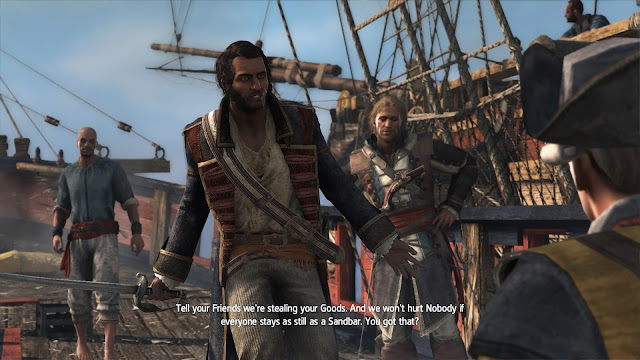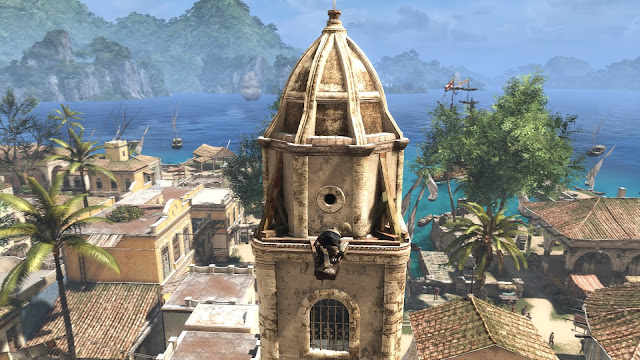A JOLLY GOOD ROGER
What is it with this franchise and its unprecedented leaps in quality back and forth? It’s enough to cause whiplash. I was still reeling from the incoherent mess that was Assassin’s Creed III when this swashbuckling, revisionist adventure emerged from the depths. Telling a surprisingly strong tale of a reluctant assassin in the Caribbean, it feels almost like a reboot—one that reignited my enthusiasm for the Assassin’s Creed brand.
Assassin’s Creed IV: Black Flag is the sixth main entry in the series, meaning I’m now roughly halfway through the overarching canon. It’s my favorite so far, rivaled only by the second game and its massive improvements over the original. Black Flag isn’t much of an “Assassin’s Creed” game—but it’s all the better for it. Both storylines, modern and historical, shed many of the constraints of earlier entries, and the gameplay follows suit. Not a second too soon. The annualized formula was growing stale, and Black Flag offers a fresh perspective with a genuinely good story to tell.
In the modern, near-futuristic timeline, you play in first-person as a faceless, nameless, silent protagonist. You’re recruited by the mega-corporation Abstergo—a front for the Templars—to work as a historical researcher for their new entertainment division. Your task is to explore the recorded genetic memories of a pirate assassin who eked out a living in and around the Caribbean in the early 18th century.
Once logged into the Animus, you assume the role of Edward Kenway, a fortune-seeking Welsh pirate (voiced—non-Welshly but excellently—by Matt Ryan). Edward sails across the Atlantic in pursuit of wealth and stability, leaving behind the woman he hopes to marry.
The opening cinematic depicts a brutal naval battle that ends with Edward’s ship destroyed. He washes ashore alongside a mysterious hooded survivor from the opposing vessel. After chasing down and killing the man, Edward discovers—via a letter—that his victim was an Assassin. Sensing opportunity, Edward seeks out the man’s contacts and attempts to impersonate him, hoping to strike it rich. Naturally, things don’t unfold as planned.
Edward doesn’t so much choose the Assassin life as trip over it. For much of the game, the Assassin–Templar conflict lingers in the background, quietly shaping the ideological tensions of the main narrative in a surprisingly restrained, almost Machiavellian way.
First and foremost, Edward is a pirate. The bulk of the adventure unfolds aboard the Jackdaw, the ship he soon acquires. On the surface, Black Flag is a richly atmospheric pirate fantasy: open seas, sea shanties, tropical islands, seaside towns, and taverns. X marks the spot, and all that. Set in the early 18th-century Caribbean, the game places Spanish and British empires in open competition for control of the region.
The cast includes a who’s who of historical pirates—Blackbeard, Mary Read, Anne Bonny, Jack Rackham, and more—many of whom become Edward’s companions. But piracy is a short-lived profession, and not all of them survive the story. As chaos spreads and trade routes suffer, colonial governments retaliate, hiring pirate hunters to clean up the mess. The noose tightens, and desperation sets in.
Edward is easily my favorite Assassin’s Creed protagonist to date. One by one, he and his allies lose safe havens. Cities like Havana, Nassau, and Kingston turn hostile, while the seas fill with imperial warships. Black Flag ends up telling a story not unlike Red Dead Redemption II: the slow decay of an outlaw way of life. It shares the same romantic nostalgia—a yearning for freedom that may be unrealistic, but irresistibly compelling to dreamers.
These themes resonate nicely with the Assassin (freedom) versus Templar (order) conflict, even when pirates and assassins feel conceptually distant. You traverse a vast open sea, engaging in piracy, trading, whaling, hunting, and treasure-seeking to fund upgrades for both the Jackdaw and Edward’s equipment. Over time, Edward begins to grasp that life is about more than personal gain, and that’s when the Assassin storyline fully steps into the foreground.
Progressing the main plot involves rendezvousing with fellow pirates, often leading to colony raids and naval battles—but also to tailing missions and eavesdropping sequences. These remain a blemish on the Assassin’s Creed experience, and Black Flag is no exception. They’re clunky, restrictive, and downright absurd when they require careful stealth maneuvering through narrow waterways in massive pirate ships.
Pure assassination missions, when they do appear, are enjoyable power fantasies. The mechanics are flexible enough to allow genuine player choice. Stealth is finally viable, though arguably overpowered thanks to poison blowdarts that either put enemies to sleep or drive them into lethal frenzies. You can trivialize most encounters with these tools; I’d almost recommend not using them.
Direct, swashbuckling combat feels more thematically fitting and is hardly more difficult. The parry-and-counter system works on most enemies, while pistols, smoke bombs, and instant assassinations clean up the rest. Dying in sword combat is surprisingly difficult.
Thankfully, the naval gameplay more than compensates. Ship combat is intuitive and satisfying, letting you aim cannons simply by turning your view. Different weapons—cannons, chain shots, fire barrels—each have distinct strengths. Reload times force tactical positioning and evasive maneuvers, and once an enemy ship is crippled, you can board it and add it to your fleet.
From the Captain’s quarters, a tactical mini-game lets you send captured ships on trade routes to earn Reales. It’s a missed opportunity that upgrade materials like wood and iron lack a proper economy; instead, you must loot ships or warehouses. The grind was slow enough that I never fully upgraded the Jackdaw.
Those who do can challenge the four legendary ships positioned at the map’s corners. One is a bona fide ghost ship, shrouded in mist and charging headlong with a devastating battering ram. Another pits you against two massive man-o’-wars at once. These encounters are memorable, tense, and appropriately punishing.
Side activities include whaling, treasure diving, infiltrating pirate caves, and even playing checkers in taverns. Raiding forts reveals map secrets, and there’s no shortage of side missions, collectibles, assassination contracts, and treasure maps. Most of it is genuinely enjoyable. The lore database adds flavor with pirate legends and amusing behind-the-scenes banter from Abstergo employees—possibly inspired by real Ubisoft office correspondence.
None of this would matter without the atmosphere that binds it all together: sea shanties, nautical jargon, character moments, storms, victories, and quiet discoveries. Surviving a storm becomes a small game in itself. The sound design brings the Jackdaw to life—creaking boards, snapping sails, roaring waves. The vibrant color palette turns the Caribbean into a sun-soaked fantasy. Each detail reinforces the whole.
Assassin’s Creed IV: Black Flag feels like a time capsule of an alternative way of life. Leaving behind law and order in pursuit of freedom is both brave and foolish, and the game is populated by people who embody both extremes. That zeal may have fueled pirate brutality—and ultimately their downfall. As Swedish poet Gustaf Fröding once wrote:
“The dream that never came true / as a dream it was lovely to have.”
I’ll admit my bias. I’m the son of a fisherman and grew up on Sweden’s northern coast, spending summers on the water. Channeling the spirit of my late father, I often ignored fast travel just to hear my crew sing my favorite shanty, “Lowlands Away.” Sometimes I’d even salute a breaching humpback whale, briefly joining the concert.
That’s how much I loved simply sailing the open sea in Black Flag.













Comments
Post a Comment